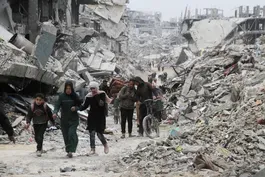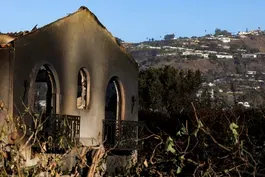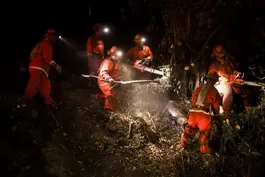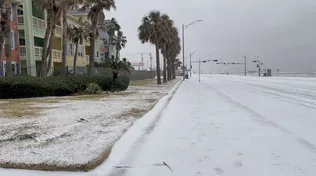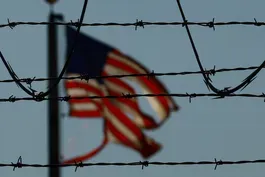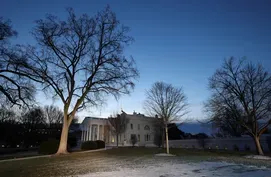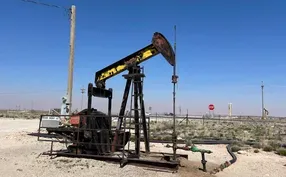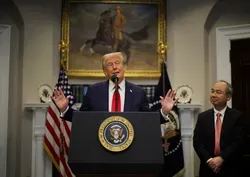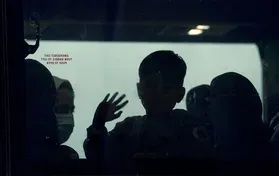
January 22, 2025 - PBS News Hour full episode
1/22/2025 | 57m 46sVideo has Closed Captions
January 22, 2025 - PBS News Hour full episode
January 22, 2025 - PBS News Hour full episode
Major corporate funding for the PBS News Hour is provided by BDO, BNSF, Consumer Cellular, American Cruise Lines, and Raymond James. Funding for the PBS NewsHour Weekend is provided by...

January 22, 2025 - PBS News Hour full episode
1/22/2025 | 57m 46sVideo has Closed Captions
January 22, 2025 - PBS News Hour full episode
How to Watch PBS News Hour
PBS News Hour is available to stream on pbs.org and the free PBS App, available on iPhone, Apple TV, Android TV, Android smartphones, Amazon Fire TV, Amazon Fire Tablet, Roku, Samsung Smart TV, and Vizio.
Providing Support for PBS.org
Learn Moreabout PBS online sponsorshipAMNA NAWAZ: Good evening.
I'm Amna Nawaz.
GEOFF BENNETT: And I'm Geoff Bennett.
On the "News Hour" tonight: The Pentagon prepares to send up to 1,500 active-duty troops to the U.S.-Mexico border to carry out President Trump's immigration crackdown.
AMNA NAWAZ: The new administration ends government diversity programs and puts federal staff on leave.
GEOFF BENNETT: And Gazans take stock of their lives and homes that are now in ruins, as the tenuous cease-fire holds.
ZAHER ABU FARAYA, Displaced Gazan: We hope to God that the truth will be the opening of the door to goodness with security and peace of mind, and that we will return to rebuild our homes and live a human life.
GEOFF BENNETT: Welcome to the "News Hour."
President Donald Trump's second term in the White House began with a flurry of unilateral actions, and he's showing no signs of slowing down.
AMNA NAWAZ: Day by day, the president's hard-line immigration policy is taking shape.
A new executive order targeting migrants at the southern border comes as the U.S. military is beefing up its presence there.
Lisa Desjardins starts our coverage.
LISA DESJARDINS: On his second full day in office from President Trump, more executive orders, today, directing agencies to remove undocumented migrants at the border and military orders, as the Pentagon announced it will start deploying up to 1,500 active troops to the border.
They will join the roughly 2,500 National Guardsman and reservists there now and have a support role, including logistics and construction, this news the same day that Trump's border czar, Tom Homan, told FOX News that border encounters have dropped since Trump took office.
TOM HOMAN, Trump Administration Border Czar: Last 24 hours, total apprehensions on the Southwest border, 766.
LISA DESJARDINS: More news, last night, Mr. Trump pardoned Ross Ulbricht, a founder of Silk Road, a Dark Web marketplace where drugs were illegally and anonymously sold.
He was given a life sentence nearly a decade ago, but libertarians fought for his release.
In Miami, Enrique Tarrio, former leader of the neo-fascist Proud Boys, arrived at the airport a free man.
Trump erased his 22-year sentence for seditious conspiracy on January 6.
And in the halls on Capitol Hill, Oath Keepers founder Stewart Rhodes appeared one day after he was pardoned for gathering weapons and plotting to violently overtake Congress.
REP. MIKE JOHNSON (R-LA): The president's made his decision.
I don't second-guess those.
LISA DESJARDINS: Asked about the January 6 pardons today, House Speaker Mike Johnson supported Trump and cast a blind eye to the violence and assaults of that day.
REP. MIKE JOHNSON: Peaceful protests and people who engage in that should never be punished.
LISA DESJARDINS: Trump has kept a furious pace... DONALD TRUMP, President of the United States: Nice to see you.
LISA DESJARDINS: ... last night holding an impromptu news conference.
DONALD TRUMP: I think we're going to do things that people will be shocked at.
LISA DESJARDINS: He was asked about his Hail Mary attempt to keep TikTok operational, despite a hovering ban under law.
Trump suggested putting it in the hands of American entrepreneurs, including ally Elon Musk.
QUESTION: Are you open to Elon buying TikTok?
DONALD TRUMP: I would be, if he wanted to buy it, yes.
LISA DESJARDINS: Other major action from Trump, he dismantled government diversity, equity and inclusion, or DEI, programs.
A memo directed federal agencies to place all DEI office staffers on paid leave starting today.
House progressives vowed to push back on Trump's agenda, particularly his crackdown on immigration.
REP. GREG CASAR (D-TX): He is trying to flood the news with all of these actions.
We're going to hold him accountable and defend the vulnerable.
LISA DESJARDINS: Congress is moving too.
MAN: The yeas are 263 and the nays are 156.
The bill passed.
LISA DESJARDINS: The House tonight gave final passage to what is set to beat Trump's first bill to sign in this term, the Laken Riley Act.
It requires federal authorities to detain some undocumented immigrants.
It passed with dozens of Democratic votes.
Also tonight, FOX News is broadcasting a Sean Hannity sit-down with Trump, his first TV interview of term 2.0.
For the "PBS News Hour," I'm Lisa Desjardins.
AMNA NAWAZ: Besides an order sending 1,500 active-duty troops to the Mexican border, late today, the Defense Department announced it had been tasked with supporting the Department of Homeland Security's deportation flights and assisting in the construction of temporary and permanent physical barriers along the border.
For a perspective on all of this, we turn now to retired Rear Admiral James McPherson.
He served as undersecretary of the Army and as the Army's general counsel during the first Trump administration.
He also had a 25-year career in the Navy, serving as its top lawyer in uniform.
Admiral, welcome back to the "News Hour."
So, the plans, as has been laid out so far, for the active-duty troops at the southern border and in support of these deportation flights, do you view that as an appropriate use of the military?
REAR ADM. JAMES MCPHERSON (RET.
), Former U.S.
Undersecretary of the Army: Well, thanks, Amna.
It's not unusual.
We have had the military on the border since the 1990s.
They have always been in a support role, that is, supporting Customs and Border Protection or the Border Patrol, through transportation, through medical support, through communications, through surveillance.
They have never been involved directly in law enforcement, that is, enforcing immigration laws by apprehending, arresting, interrogating individuals that are captured attempting to come across the border.
It's my understanding that this current deployment will keep with that current -- that previous mission.
In other words, these troops will be in support of Customs and Border Protection.
They will not be engaged in law enforcement.
Now, that may change dramatically in the days to come based upon the executive orders that the president signed Monday afternoon.
AMNA NAWAZ: And based on that executive order, I know there are a lot of questions, because senior military officials did go on to say they anticipate many additional missions ahead.
What could those entail?
Could U.S. military troops be asked to arrest migrants at the border to try to stop them from crossing?
And would that be appropriate?
REAR ADM. JAMES MCPHERSON (RET).
: Well, to try to stop them from crossing, the answer is yes.
Those two orders, the first one declared a national emergency at the southern border.
That's not unusual either.
The president did that in 2019 during Trump one, and as a result of that could transfer funds to border -- what we know as the border wall.
But this national emergency has wording that wasn't included in that first one in 2019 that attempts to preclude the legal challenges that were brought against that transfer of funds.
More importantly was the second executive order he signed, which directed Northern Command, that is, the geographical combatant commander for North America, Mexico, United States, Canada, to change what's called their unified command plan.
That's a plan that sets forth the mission, the responsibilities of what a combatant commander does.
And they were specifically directed to change their unified command plan to now include sealing the border, maintaining the sovereignty of the United States, and repelling invasion.
If that in fact is done and active-duty troops are sent to the border, they will be sent to the border not to enforce immigration laws, but to repel an invasion, which is very different.
They won't be involved in a law enforcement role, but a military role of, again, repelling that... AMNA NAWAZ: Admiral, if I may, you're using this word invasion, which we have heard the present use repeatedly.
I should point out that border numbers have actually been coming down dramatically over the last several months, though they did reach record highs in the previous administration.
Do you view what's happening at the southern border as an invasion?
REAR ADM. JAMES MCPHERSON (RET).
: The facts simply don't support that, Amna.
As we heard from the border czar, even in the past few days, the numbers have dropped dramatically.
And they have dropped dramatically what they were even in the Trump one administration.
So I don't think that this -- that it changed the unified plan of including now repelling an invasion has any factual basis.
AMNA NAWAZ: So we have -- we should point out, U.S. forces overseas, for example, in Iraq and Afghanistan were asked to provide security for cities and villages.
Why can't U.S. military forces do similar kind of missions along the U.S. border?
REAR ADM. JAMES MCPHERSON (RET).
: Because when they were in Iraq and Afghanistan, they were opposing an armed force.
They were engaged in armed encounters.
They were engaged in traditionally the mission of our military, and that is to fight our armed -- fight our wars.
We don't have a war going on at the southern border.
We have a law enforcement crisis perhaps.
But that's not an invasion.
AMNA NAWAZ: One of the things my colleague Nick Schifrin reported today was, this deployment increases the number of troops at the border by 60 percent to some 4,000.
One senior official said the number could go as high as 10,000.
What's your reaction to that?
REAR ADM. JAMES MCPHERSON (RET).
: Again there are some -- the current deployment is in support of border protection.
I would say that border protection may use them in extended manner.
But under the current orders under the current law, they can only be used in that support role.
They can't be used to enforce immigration law.
AMNA NAWAZ: But 10,000 U.S. troops at the border, what does that say to you about the use of active-duty military troops?
REAR ADM. JAMES MCPHERSON (RET).
: Well, it says that they're being ill-used, if you will, that it's detracting from their mission to protect our country, is detracting from their operational tempo, and is detracting from their readiness.
I think it does a disservice to our military to send them to the border to try and engage in apprehending illegal aliens, if you will.
AMNA NAWAZ: Finally, Admiral, we know that the president has directed the incoming secretary of defense and incoming homeland security chief to report back within 90 days if they think that the Insurrection Act should be invoked.
That's an 1807 law that would allow U.S. troops to be used in civilian law enforcement on U.S. soil.
What's your reaction to that?
REAR ADM. JAMES MCPHERSON (RET).
: That's a dangerous route we should not be taking.
These current executable orders only speak to the southern border.
They don't speak to using the military in the interior of the United States.
The Insurrection Act would give the president the authority to do just that, to use our armed forces in Chicago, in Detroit, in Atlanta.
I think that's dangerous.
AMNA NAWAZ: That is retired Rear Admiral James McPherson joining us tonight.
Admiral McPherson, thank you for your time.
We appreciate it.
REAR ADM. JAMES MCPHERSON (RET).
: Thank you.
GEOFF BENNETT: We start the day's other headlines with snow, and plenty of it.
A massive winter storm has left record-breaking amounts across much of the Gulf Coast and the Carolinas.
MAN: Melt the rest of it off.
GEOFF BENNETT: In North Carolina, they were digging out today as the storm finally moved offshore.
At least three people have died across Georgia and Texas.
The coastal city of Galveston saw a significant amount of snow for the first time in nearly two decades.
New Orleans saw a record 10 inches of snow, smashing the previous record set back in 1963.
The NBA even had to postpone a game there.
More than 2,000 flights have been canceled in and out of the U.S. today as airports begin to resume normal operations.
In its wake, the snowstorm left frigid temperatures across large parts of the country.
More than 60 million Americans today were under some form of cold weather alert.
But forecasters say a slow return to more normal temperatures will begin -- will bring some relief by the end of this week.
Meantime, Southern California is facing dangerous weather conditions as it battles new fires.
The Hughes Fire erupted this morning, prompting evacuation orders in parts of Northern Los Angeles County.
It's exploded in size, burning through more than 5,000 acres in just hours.
The next threat is rain, and that's expected to move in on Saturday.
County officials say heavy showers could wash debris, including toxic ash, into local waterways.
KATHRYN BARGER, Los Angeles County, California, Board of Supervisors: Rains are in the forecast, and the threat of mud and debris flow in our fire-impacted communities is real.
We have to be prepared.
This includes clearing drains and roadways, preparing our debris basins and taking other critical flood protection measures.
GEOFF BENNETT: Officials also say they have ordered an investigation into L.A. County's emergency alert system.
That's after residents of one area of Altadena where 17 people died say they did not get an evacuation warning until hours after the fire started there.
In Tennessee, police say a female student was killed and another student injured during a shooting at a Nashville high school today.
Authorities say the 17-year-old male shooter was a fellow student at Antioch High School.
He's said to have opened fire in the school's cafeteria before shooting and killing himself.
The injured student was grazed by a bullet and is being treated.
Today's shooting comes nearly two years after a gunman killed six people at a Nashville elementary school, including three children.
The Trump administration is halting some communications from federal health agencies to the public.
In a memo, the acting secretary of the Department of Health and Human Services ordered a -- quote - - "immediate pause on all regulations, guidance, announcements, press releases, and social media posts."
That's until the content is reviewed and approved by a political appointee.
The measure affects agencies such as the CDC and the FDA.
The memo says the pause is an effect until February 1.
Britain's Prince Harry claimed a monumental victory today after Rupert Murdoch's tabloids issued a rare apology for -- quote -- "serious intrusion" into his life.
It's the first time that newspapers acknowledged hacking Harry's phone, spying on him, and misusing his private information between the years of 1996 and 2011.
The media giant also agreed to pay the duke of Sussex a sizable undisclosed settlement.
And it acknowledged the intrusion the life of Harry's mother, the late Princess Diana.
Harry has blamed the media for the car crash that killed her in 1997.
On Wall Street today, stocks ended higher amid a surge in big technology stocks.
The Dow Jones industrial average added about 130 points on the day.
The Nasdaq jumped 250 points to close above the 20000-point level.
The S&P 500 hit an all-time high during the day and closed with a gain of 37 points.
And the Songwriters Hall of Fame has a new class of inductees.
They represent the best of rock, R&B, country, and funk.
GEOFF BENNETT: George Clinton is finally getting a spot after a career of hits with Parliament-Funkadelic, plus solo work and his collaborations with artists across hip-hop and R&B.
The Doobie Brothers also made it in, with members Tom Johnston, Michael McDonald, and Patrick Simmons inducted.
Mike Love of The Beach Boys joins his bandmate Brian Wilson in the Hall of Fame.
And so does country music writer Ashley Gorley.
He's got 80 number one radio singles under his belt.
The induction ceremony takes place this June in New York City.
Still to come on the "News Hour": the Trump administration cancels flights for refugees who were already cleared to settle in the U.S.; we examine the president's plans to expand energy production in the U.S. and roll back climate initiatives; and how incarcerated firefighters are helping battle the blazes around Los Angeles.
AMNA NAWAZ: As we reported earlier, the Trump administration ordered all federal employees who work in diversity, equity, and inclusion roles to be placed on paid leave starting today.
In a memo issued by the Office of Personnel Management, agency supervisors are also asked to submit a written plan by the end of the month for dismissing the employees.
It's part one of the administration's efforts to upend DEI efforts nationwide.
Jeff Green, covers DEI efforts for Bloomberg News and joins us now.
Jeff, welcome to the "News Hour."
Thanks for being with us.
JEFF GREEN, Managing Diversity Reporter, Bloomberg: Thanks for having me.
AMNA NAWAZ: So the memo tells agencies to put these staffers on paid leave by 5:00 today.
A plan to fire them, they need to have by next Friday.
Just in the way of one example, there's a watchdog group called American Transparency that says the Department of Health and Human Services alone employs 294 DEI staffers.
But, Jeff, do we know how many federal employees we're talking about here?
JEFF GREEN: We don't.
It's one of the things we're trying to figure out as well.
The scope of this is not completely clear, but it is likely to be, as you said, hundreds of employees.
It's not a small number.
AMNA NAWAZ: And why don't we know those figures?
JEFF GREEN: Because it wasn't immediately available in how the order was structured.
And it's not something that's something we have really been tracking in terms of how many DEI employees there are in the federal government, as the same in corporate America.
We really don't know how many of these people are employed in that specific role.
AMNA NAWAZ: We know there's been some effort to try to gather some of this data in the Biden administration, right?
There was an executive order back in 2021 that mandated all agencies to have a diversity plan to start to track the data on hirings and promotions.
In their first DEI report in 2022, they had demographic data for the federal work force.
It said it was about 60 percent white, 55 percent male overall, at the senior executive level, more than 75 percent white, more than 60 percent male.
But, Jeff, this is not just about the federal work force, is it?
This Trump order directs agencies to make sure contracts and grants are in line with this anti-DEI stance.
What's the impact here?
JEFF GREEN: Well, the impact even goes beyond that.
He's also asked these agency heads, while they're at it, to identify nine companies or institutions, public companies and institutions of large size that might be violating DEI laws and come up with a plan for maybe investigating them.
So this goes way beyond the federal government as of the executive order that came out last night.
Every company in America has to stop and take notice of what happened today.
AMNA NAWAZ: And are there any kind of challenges or new steps in place that could prevent these sort of policies from going into place?
Or is it just that these employees will be fired and all these private companies, you say, will have to adjust their plans as well?
JEFF GREEN: Those are basically two different questions.
For federal employees, Trump is the CEO of America, at least of the administration.
And he can fire people as he wants.
It doesn't mean there can't be litigation later, but he does have the will, just -- or the ability, just like anybody who runs an organization, to decide who works there and who doesn't, to some degree.
I mean, there are some limitations of union contracts and things that might control some of what he can do.
But when it comes to the external actions, that's kind of unclear.
He can definitely ask his agencies to come up with a list and he can have that list and he can publish a list.
It's not 100 percent clear then what would happen to that list.
He could have the attorney general or the Department of Justice or the Department of Labor launch an investigation into these companies, though.
That is within the -- I mean, all of these things are technically potentially within the scope of what Donald Trump can order his administration to do.
AMNA NAWAZ: And these are issues I know you have been long tracking.
So give us a sense of where this order, this effort stands in sort of the broader view of the Trump administration when it comes to DEI.
JEFF GREEN: Well, there's been this expectation that he was going to do something about DEI.
And building up to this over the last couple years, there's already been a conservative backlash against DEI, which has prompted many companies to scale back what they're doing.
And so there's been this sense that, when Trump came in, there would be some escalation.
It wasn't clear to what level.
I think this is beyond what some people were expecting, but maybe in line with the conservatives were warning was going to happen.
AMNA NAWAZ: All right, that is Jeff Green, who covers DEI efforts for Bloomberg News.
Jeff, thank you for joining us.
JEFF GREEN: Thanks for having me.
GEOFF BENNETT: When it comes to immigration policy, President Trump's executive order suspending all refugee admissions into the U.S. has far-reaching consequences, including for those who helped America's mission in Afghanistan.
Our White House correspondent, Laura Barron-Lopez, has more.
LAURA BARRON-LOPEZ: Tens of thousands of Afghans, including family members of active-duty U.S. military, are now in limbo, despite some already receiving approval to relocate to the U.S.
Joining me now is Shawn VanDiver, founder and president of AfghanEvac, a coalition of organizations that works to resettle Afghans who worked with the United States prior to the 2021 withdrawal.
Shawn, almost 2,000 Afghans had already been approved to resettle in the U.S. before January 27.
That was the date the executive action was supposed to take effect.
But, overnight, the State Department canceled all flights, canceled processing.
What are you hearing from families and people who were expecting to relocate to the U.S.?
SHAWN VANDIVER, Founder, AfghanEvac: Sure.
Thank you for having me on.
I want to add some clarity to that number.
About 2,000 was the number that we expected to travel over three months, what we thought the pause was going to be, but it's indefinite.
So, people are being pulled off flights now.
Flights are being canceled, but the truth is there are more than 10,000 Afghans who are fully vetted, security vetted, medically cleared, and ready to go.
And now they don't know what's coming next.
We have asked the State Department to give very clear guidance to them, that we hope they're going to do that.
They haven't affirmatively confirmed that yet.
But, look, the truth is, is, these people who have been waiting for 3.5 years in many cases are now stuck in limbo yet again.
And it feels very much like August of 2021.
We're getting frantic text messages.
People are begging for help.
My e-mail inbox is just buzzing over and over and over again.
My phone is draining so fast.
And people are terrified.
LAURA BARRON-LOPEZ: We should clarify that the president's executive action doesn't apply to Afghans approved for Special Immigrant Visas.
Those are people who worked for the U.S. armed forces, but it will impact thousands of others, as you said, Shawn.
And refugee admissions were on the upswing in recent years, reaching around 100,000 in the last year.
But the Trump White House argues that the U.S. lacks the ability to absorb large numbers of migrants, including refugees, without compromising resources, safety and security for Americans.
What's your response to that?
SHAWN VANDIVER: A couple things, right?
So, Special Immigrant Visas are not impacted by this.
That's really important for Afghans to hear and our advocates to hear.
The idea that the country can't absorb these folks is -- like, I just don't think it's real.
And what is really important to note is that USRAP is a legal immigration program.
And the vetting that people go through to go through the United States Refugee Admissions Program is more strict than police officers are vetted or our military or any number of folks.
Like, it is the gold standard in vetting.
If you're coming here as a refugee, we know you're safe.
LAURA BARRON-LOPEZ: President Trump has also spoken often about the chaotic military withdrawal from Afghanistan in 2021, often blaming his predecessor on the campaign trail.
But this action, how does it affect the overall mission to safely evacuate and resettle those Afghans who helped the U.S.?
SHAWN VANDIVER: Well, just like you said, President Trump talked a lot about this on the campaign trail.
We are hopeful that because he brought it up at every debate, they brought it up every day at the RNC, he did a much better job than President Biden did of standing by the Abbey Gate families.
We know that he cares deeply about Afghans.
So we think this is a mistake.
And we know that he values loyalty.
We also know he likes to make a deal.
So we're hopeful that he and his administration are ready to come to the table and talk about how we can make a deal to protect these loyal folks that stood by us for 20 years of war.
These people are family of the United States active-duty service members in the U.S. military.
They're partner forces that trained alongside our Green Berets, that trained, fought, and bled alongside our Green Berets.
These are folks that flew in the Afghan air force, women who flew in the Afghan air force.
They're judges and prosecutors, all sorts of people that did everything they could to stand up for the idea of America.
And because they did that, they are at risk.
And we owe them a debt of gratitude and we owe them their shot at the American dream.
LAURA BARRON-LOPEZ: You called this a mistake.
Are you and others talking to the Trump White House about reversing course on this or about providing an exemption for Afghans?
SHAWN VANDIVER: We have been trying to get ahold of them.
The phones don't work yet, I don't think.
We want to work together on this.
We have worked.
We worked with the Biden administration for 3.5 years.
AfghanEvac is dedicated -- we're a nonpartisan organization.
If you're willing to help Afghans, we're here to help.
We have the trust of Afghans.
And for good reason, Afghans don't trust the United States government.
We have got to rebuild that trust.
And we got to make sure that we deliver on our promise.
And President Trump signed the deal to close us out of Afghanistan.
We're confident he is ready to see us through.
He just has to know the impacts of the orders that he signed.
LAURA BARRON-LOPEZ: Shawn, I spoke to a service member in the Army's 82nd Airborne, and he told me that his sister and her husband are still in Afghanistan, that they had almost been done with the process.
And the only thing that he was asking of the government was to help his family, who he said remains in danger and is being threatened by the Taliban.
As a veteran yourself, what do you say to these service members?
SHAWN VANDIVER: Well, first, I have to say that I'm so sorry you're experiencing this.
I don't think President Trump meant to do this.
We hope he didn't mean to do this.
It's so important that our commander in chief stand by members of the military.
We talked a lot about lethality during this campaign.
And it's really hard for members of the military to be ready to serve if they're worried about the Taliban injuring their parents.
LAURA BARRON-LOPEZ: Shawn VanDiver of AfghanEvac, thank you for your time.
SHAWN VANDIVER: Thank you.
Have a great day.
GEOFF BENNETT: Within hours of taking office, President Trump declared a national energy emergency as part of his plan to push for more oil and gas drilling and to heavily boost fossil fuels.
But that's not all.
The president also started a process to reverse much of what former President Biden did on green energy, big changes that could ease or end new regulations on greenhouse gases and cut development of electric vehicles.
And, as he did during his first term, President Trump said the U.S. will pull out of the international Paris climate treaty.
For more, we turn now to Scott Waldman, a White House reporter for Politico's E&E News.
Thanks for being with us.
So, Scott, the U.S. is right now producing more oil and natural gas than any other country in the world at any point in history.
So what does declaring a national emergency, a national energy emergency, actually do?
What does it achieve?
SCOTT WALDMAN, White House Reporter, E&E News By Politico: Well, Trump said that it was necessary because he wanted to ensure the -- basically, the security of the electrical grid, as well as the nation's security.
He claims that the grid is potentially unreliable and has been failing at some points, and that a big boost of energy is needed to fix that.
What the actual order will do in terms of what powers it will give him, they're very limited.
It's not going to give him a lot of additional powers to boost energy in this country.
Obviously, that's going to be based on the market and the willingness of drillers to put -- to do fracking throughout the country.
And that's not going to be really affected by this.
I think the way that the energy emergency is written is that it's supposed to alleviate some pressures that states and other entities have placed on, like, pipelines and other energy infrastructure in particular.
But just sort of declaring this with a stroke of a pen does not mean that you can supersede state and local laws.
I mean, the federal government doesn't have that power.
It can, of course, control what happens on federal land.
But a lot of this infrastructure is sited on private property, on state property throughout the country.
So it's not as simple as just declaring that we're going to have this big boost of energy because an emergency has been declared.
GEOFF BENNETT: So what then strikes you as the most significant action the president has taken on energy and environmental policy?
SCOTT WALDMAN: Well, certainly pulling out of the Paris climate agreement.
I mean, that is something everybody expected to do.
And that's going to take -- technically, it takes up to a year.
Trump has said he will do it immediately, but under the terms of the agreement, it should take up to a year.
It sort of takes the U.S. out of the leadership position when it comes to international negotiations and also sort of leading the way.
The Biden administration really tried to make the U.S. the leader once again, in particular in driving clean energy economy.
Regardless of what your politics are, I think the Biden administration demonstrated fairly thoroughly that there's a lot of energy jobs to be created in the clean energy space.
So that's one thing that Trump did.
I think also pulling back -- saying he's going to pull back some of the funding that is going to -- under the Inflation Reduction Act, which was really a climate-centric bill, some of that funding to E.V.
chargers to -- that's going to go to build battery factories for E.V.s.
Now, a lot of that has been congressionally appropriated, but I think the Trump administration, and we saw this today in the hearing with his pick to head the Office of Management and Budget, a man named Russ Vought, is basically saying that they're going to use -- they're going to go against the 1974 Impoundment Act, which would give the president power to withhold basically funding the Congress has appropriated when it comes to this clean energy.
I think that that is certainly a legally untested case that's going to end up being a fight that goes all the way to the Supreme Court, whether they can do that.
And I listened to a hearing last week where this was brought up.
And Senator Rand Paul from Kentucky was very critical of the administration's plan to potentially override Congress and withhold funding, even if that funding happened to be for clean energy projects.
GEOFF BENNETT: Right, and there are certainly market forces that continue to propel the transition to electric vehicles.
But can the Trump administration hold up the E.V.
tax credits?
SCOTT WALDMAN: You know, yes, they can sort of - - I think it's safe to say they're going to try.
Again, that money's congressionally appropriated.
Whether they can do that is going to be really up to a court fight coming up.
They have pledged to start withholding it.
And even Elon Musk, of course, the owner of Tesla, has signed off on that.
Musk himself believes that it'll hurt companies like GM and Ford more than it would hurt -- and Hyundai and other companies that are making E.V.s.
Musk thinks it'll hurt them more than it hurts Tesla.
But whether any of this survives the oncoming court battles remains to be seen.
GEOFF BENNETT: So, if you take the energy policy and combine it with the Trump administration pulling the U.S. out of the Paris climate accord, what impact might all of this have on efforts to curb the worst effects of climate change?
SCOTT WALDMAN: Well, certainly, Trump, who denies climate science, doesn't worry about climate change, and just scientists have said for many years that increasing fossil fuel use and consumption is going to drive the worst effects of climate change.
We're already seeing climate affecting us throughout the country.
Obviously, in Los Angeles right now, those wildfires have been fueled by climate change.
They have been made worse by climate change.
It didn't start the fires, but it's made them far worse by creating or contributing to dire drought conditions that have desiccated the landscape and just created fuel for that fire.
There's also areas where rising sea levels are claiming homes throughout the country.
So, certainly just leaning into fossil fuels, stripping away any plans to cut carbon emissions, it's going to make -- it's going to make that worse.
But, again, we're talking on such a long time scale here.
Four years of the Trump administration are not going to set back the U.S. efforts in a way that won't be fixable by some future administration down the line.
Obviously, every moment now, according to scientists, is important to combat climate change, but it's not like all hope is lost.
I actually talked to Biden's climate adviser, former climate adviser, Gina McCarthy, today, and she said she was cheered a little bit after seeing some of these Trump executive orders, because she said they're just not going to hold up in court.
And she knows more is coming to try to dismantle Biden's climate legacy.
But, really, she said it's going to take a lot more than what we have seen so far.
GEOFF BENNETT: Scott Waldman of Politico's E&E News, thanks for sharing your reporting and insights with us.
SCOTT WALDMAN: Thanks for having me.
AMNA NAWAZ: Today, President Trump's Middle East envoy said he would soon travel to the Middle East and be part of a team of -- quote - - "outside observers," situated both inside and along the Gaza Strip to ensure safety during the days-old cease-fire between Hamas and Israel.
Nick Schifrin takes a look now at the relative quiet in Gaza and what Palestinians are finding as they return home.
NICK SCHIFRIN: Today in Rafah, the damage and destruction is apocalyptic, a gray ghost town of dust and debris, structures flattened into pancakes, buildings obliterated or blown into carcasses.
Gaza City used to be one of the most densely populated spots on the planet, population more than half-a-million, today, stripped of green, a shell of what it used to be.
In South Gaza, amidst the displaced, diggers, the first step to clearing the rubble, so families can return home, like the Siam family, who we filmed today arriving for the first time to their home in Rafah turned into a mountain of ruins.
They salvaged what survived, a wooden chair, a single mattress, books amid the debris.
They left this home intact eight months ago.
Today, 50-year-old Lutfi Siam called the destruction worse than a nightmare.
LUTFI SIAM, Displaced Rafah Resident: When we came here today, we were expecting to find something from our homes, but we were honestly surprised.
It's an area that's been completely destroyed.
If you pan the camera around, you will see something that is unfathomable to the human mind.
NICK SCHIFRIN: In this West Rafah neighborhood, it appears no structure still stands.
And yet they smile and embrace, even if their future is uncertain.
LUTFI SIAM: Today, we're living in indescribable times.
We have no idea what is next for us.
We don't know how we will live or rebuild.
We don't know.
NICK SCHIFRIN: Israel says Hamas used Rafah as one of its bases of operations, with hundreds of tunnels beneath the homes.
Boys who have been displaced for months try to be boys, but are confronted with their former homes, their former neighborhoods, their former blocks left uninhabitable.
Israel's air campaign was one of the largest ever in modern warfare against an enemy embed in civilian infrastructure, which today is crushed.
Right near the coast, we found the Zoroub family house, where the walls have become windows and debris fills the floor and as far as the eye can see.
SAMAH ZOROUB, Displaced Rafah Resident: What am I going to recover?
Look, I can't recover anything.
It's all ruined, full of soot.
Let's not kid ourselves.
Look what happened to us.
Look around.
NICK SCHIFRIN: And when you look around, Hamas is back.
Residents say they're providing security, even overseeing the removal of rubble.
These men either fought or hid during the fighting and have now dusted off their uniforms.
If Israel's goal was to eliminate the group entirely, that goal has not been met, which is why far right Finance Minister Smotrich vows to bring down the coalition government unless Israel resumes the war after the six-week cease-fire.
BEZALEL SMOTRICH, Israeli Finance Minister: We will be glad and emotional for the return of some of our hostages, but we will remember the hard war that awaits us after that to go back and fight until victory.
QUESTION: How confident are you, Mr. President, that you can keep the cease-fire in Gaza and conclude the three phases of this deal?
DONALD TRUMP, President of the United States: I'm not confident.
It's not our war.
It's their war, but I'm not confident.
NICK SCHIFRIN: On Monday night, President Trump doubted the cease-fire's longevity, but also imagined Gaza as an opportunity for investment.
DONALD TRUMP: You know, Gaza's interesting.
It's a phenomenal location, on the sea, the best weather.
Everything's good.
It's like - - some beautiful things could be done with it.
NICK SCHIFRIN: Palestinians we spoke to urged Trump to push Israel to extend the cease-fire.
RAMEZ GENDIA, Displaced Gazan: My message to Trump is a big one.
We want peace and we don't care about anything else.
That's it.
Enough war.
Enough war.
NICK SCHIFRIN: The war's pause has allowed a surge of aid.
The U.S. says more than 2,400 trucks have entered Gaza since the cease-fire began Sunday morning.
But there is a long way before Gazans' hunger can be satisfied.
Until then, Zaher Abu Faraya sits scarred by the schism this war wrought.
His granddaughter is more willing than he to save memories of a life displaced.
ZAHER ABU FARAYA, Displaced Gazan: We hope to God that the truth will be the opening of the door to goodness with security and peace of mind, and that we will return to rebuild our homes and live a human life after the suffering we have seen and the pain we have lived.
NICK SCHIFRIN: And after the suffering and pain, there is a desperate hope that the fire will not return.
For the "PBS News Hour," I'm Nick Schifrin.
GEOFF BENNETT: The fire danger in Southern California is far from over.
And as first responders continue their battle against major wildfires, there's also renewed attention around a lesser known group that's also on the front lines.
That's incarcerated firefighters.
Stephanie Sy has more.
STEPHANIE SY: More than 1,000 of the firefighters that have been battling the Southern California wildfires are convicts, part of a long-running state program.
Training and deployment onto the fire lines is voluntary, with inmate firefighters making a maximum of about $10 a day or up to $30 if they work a 24-hour shift.
They may also qualify to get two days shaved off their sentence for every day they work.
The state has become reliant on these men and women during the increasingly long fire season, and the program is estimated to save California tens of millions of dollars a year.
Supporters say the program offers a pathway out of prison, but critics say the work and pay are exploitative.
For more, I'm joined by Sam Lewis, executive director of the Anti-Recidivism Coalition.
Sam, thank you so much for joining the "News Hour."
I understand that you have personally visited these firefighters at their base camps in L.A. very recently.
Tell me, how is their morale?
Are they pumped that they're able to help in this crisis?
SAM LEWIS, Executive Director, Anti-Recidivism Coalition: Absolutely.
So I was able to visit both of the base camps, one at the Holton base camp.
The other was in the Rose Bowl.
Morale is high.
As one of the hand crews said: "This is my way of giving back.
I made mistakes in the past, but this clearly demonstrates that redemption is possible."
And so we threw the football around a little bit.
They had great food from our public from people that have donated.
We had a lot of other people that visited just to let them know how much that we appreciate them and how grateful we are for them actually helping suppress this fire.
STEPHANIE SY: I have seen pictures of even celebrities visiting these incarcerated firefighters.
Now, I know, on the fire lines, they have to wear a special uniform, an orange uniform that depicts them as inmates.
Do they face unique challenges in their role?
And are they treated any differently than other firefighters, as far as you can tell?
SAM LEWIS: I could not tell the difference.
For instance, both firefighters that are not incarcerated and the hand crews both work 24-hour shifts.
They sleep in tents on the base camps.
When it's time for them to take breaks at the fire line, they literally will go -- will lay on the ground.
And that's true of regular firefighters also.
I have pictures of firefighters using their helmets to take a nap when it's time for them to have a break.
And so the difference is, one person is incarcerated and the other one isn't.
And the pay is another.
However, I must say that Assemblymember Isaac Bryan has now introduced a bill to fix the pay inequity in this particular program.
STEPHANIE SY: Some of them get paid as low as a dollar a day.
And, to that point, the program has drawn criticism, as I'm sure you're aware over the years.
I want to play with Amika Mota, a criminal justice reform advocate and former inmate firefighter herself, told us earlier today.
AMIKA MOTA, Sister Warriors Freedom Coalition: It's wild to think that we are not even paying minimum wage to people that are doing this extremely dangerous work.
But that is the other issue.
It is very dangerous work.
Folks are often signing their rights away to be out there fighting fires on the fire ground.
And folks are not being equipped with a path to solid career firefighting wages when they come home.
That's not to say there are not programs that exist, but they're not enough.
They're not sufficient for what we need to actually be supporting people to make their way into firefighting careers when they get home.
STEPHANIE SY: Sam, what is your response to some of her points?
We talked about compensation, but what about some of the other points that she makes?
SAM LEWIS: In the past, those points were correct.
Pay is still at this -- the Assembly Bill 147 has not passed yet.
It is in progress.
But I would hope that voters would definitely support Assemblymember Isaac Bryan in making sure that hand crews are paid equivalent of the lowest-paid firefighters on the line.
In terms of a pathway, ARC has helped create a pathway with California wildland firefighters and the California Department of Corrections and Rehabilitation called the Ventura Training Center.
This is an incredible program that allows people that have been incarcerated in that are hand crews in fire camps to come home, train to become certified firefighters, get their record expunged, and get their EMT license, and become either Cal Wildlands firefighters or firefighters in municipalities.
There's a second site we just opened up in the past year called the Los Angeles Training Center.
And this -- we have completed our first cohort.
We're about to start our all women's cohort for this firefighting program that would also create pathways for people that are coming out of these camps to become full-time either Cal Wildlands firefighters or municipal firefighters throughout the state of California.
STEPHANIE SY: You were incarcerated yourself years ago, Sam, and I imagine you and others face stigma once you have paid your debt to society.
You go out.
And it's hard, we hear over and over, for the formerly incarcerated to get jobs.
Is it any different really for these firefighters?
SAM LEWIS: Initially, it was.
But now VTC, the Ventura Training Center, has been up and standing since 2018.
We put over 200 formerly incarcerated firefighters into firefighting careers.
And so, when they're welcomed into this unique community of firefighters, as I have heard some of the chiefs say, some of the battalion chiefs say, it's a way of life.
It's not just a career.
And so they're welcomed into a different lifestyle.
And it's 100 percent.
We'd love for you to be able to come see some of our graduations, because this is 100 percent true when it comes to welcoming people that have been incarcerated into a different level of redemption, just demonstrating that they have always had value as human beings.
Now we see them being given the opportunity to live their best life and become the best version of themselves.
STEPHANIE SY: Sam Lewis with the Anti-Recidivism Coalition, thanks for your insights.
SAM LEWIS: Thank you.
Thank you so much.
AMNA NAWAZ: Now we remember some of the lives lost in the California fires.
Authorities are still searching, but, so far, at least 28 people have died.
At least two of the victims families have filed lawsuits against Southern California Edison, alleging that the utility company was negligent and that its equipment may have sparked a fire.
As we learn more about the victims, we're taking a moment to focus on the legacies they leave behind.
Tonight, we continue with these eight stories.
Mark Shterenberg was born in the Soviet Union and came to the U.S. in 1980.
The 80-year-old ran three miles every morning, including on the day he died.
His granddaughter Tatiana said his motto was study math, keep money in the bank and do three good things every day.
Kim Winiecki died in the Eaton Fire after telling friends she wasn't going to evacuate.
The 77-year-old lived alone in Altadena and was a private person.
Her longtime friend Jeannette told reporters -- quote -- "Her house was everything.
It was her haven, her sanctuary and security."
Sixty-nine-year-old Jeff Takeyama lived in his Malibu home for 41 years.
He was a beloved husband, father and grandfather.
In every fire that came before, he worked to keep neighbors safe.
His family said - - quote -- "He was the protector of our home and our neighborhood.
Our father's absence leaves a hole in our family that can never be filled."
Charles Mortimer was a world traveler with an infectious smile who lived life to the fullest.
In a statement, his family said -- quote -- "He will be remembered as a man with a quick wit, a brilliant mind and a love for his family."
Mortimer was 84 years old.
Annette Rossilli refused to evacuate her Pacific Palisades home, despite the pleas from neighbors and loved ones.
She didn't want to leave her pets behind, a beloved dog, two parrots, a canary and a turtle.
Rossilli was 85.
Edwin Cridland, 94, loved vintage cars and is remembered as a kind soul to those who knew him.
His friend of 34 years Dennis told reporters -- quote -- "When my time comes, if I can be half the man he was and go to the same place, then I will be OK with it."
Evelyn McClendon, 59, lived next to her brother Zaire, who was helping to evacuate their disabled mother.
Zaire told his sister, "It's time to go," and thought she was following them.
He told reporters -- quote -- "I don't know why she didn't leave.
It's just so much.
The life has been sucked out of us."
Eighty-four-year-old Zhi Feng Zhao, a native of China, lived alone in Altadena after losing his wife during the pandemic.
His son Shaw planned to visit his father soon and said that his dad -- quote -- "taught me how to think critically and solve complex math problems.
Thank you, dad.
Rest in peace."
GEOFF BENNETT: During the pandemic, a project called Artists and Elders was formed to connect artists to isolated older adults in their communities.
Here, the founders share their Brief But Spectacular takes on the art of bringing people together.
ERIKA CHONG SHUCH, Co-Founder, Artists and Elders: So in March of 2020, there is this thing that was happening in the world that forced us all to spend lots of time at home.
And we all started getting really worried about the elders in our own lives.
And we realized if we were worried about our parents, about our grandparents, surely there are so many other elders that are experiencing a sense of prolonged isolation.
And we started learning about isolation as a health risk.
And so we started this project called Artists and Elders, with the idea of bringing individual artists and individual elders together for creative exchange.
For You is a performance collective.
We started making performances together in 2017 and we make performances that bring diverse groups of strangers together, and we think about performance-making as gift-giving.
RYAN TACATA, Co-Founder, Artists and Elders: The idea of gifting an experience.
Like, all gift-giving and gift receiving is a sort of experience, like the experience of opening up a present at Christmas or like the anticipation of giving something to another person.
ROWENA RICHIE, Co-Founder, Artists and Elders: Thinking about what would make a great gift for that specific person, that really gives us a lot of information and enthusiasm for what we're doing.
ERIKA CHONG SHUCH: My grandparents, their names were Phyllis (ph) and Milton (ph) and they lived to be, like, in their mid-90s, and they were our biggest fans.
They loved to come see performances.
They would always say that they don't understand the art, but they love me and they love the people that I work with.
And so, when they became too ill to come to see performances, we had the idea that we would make something for them in their homes.
So this idea of bringing a performance, creating something that is bespoke, creating something with the intent to move specific people that we know, that was kind of the root and genesis of some of the For You ideas.
RYAN TACATA: In our process, we get to know people and we spend a lot of time hanging out, getting to know the things that get them ticking.
And then we use that information to make experiences that hopefully move them in the world.
Something I have discovered in Artists and Elders and working with older folk is that we don't ask a lot about their futures.
That, for me, is one of the most fun things to do in our process.
ROWENA RICHIE: There's this stereotype that older people need to be taken care of.
It's infantilizing.
One thing we do is listen.
We listen a lot.
We ask a lot of questions.
We want to know what lights you up.
ERIKA CHONG SHUCH: And so this act of generosity, although it's us giving something, it actually feels like it's reciprocal.
ROWENA RICHIE: My name is Rowena Richie.
RYAN TACATA: My name is Ryan Tacata.
ERIKA CHONG SHUCH: My name is Erika Chong Shuch.
And this is our Brief But Spectacular take on... RYAN TACATA: ... how to bring people together as art.
GEOFF BENNETT: That's great.
And you can watch more Brief But Spectacular videos about aging online at PBS.org/NewsHour/Longevity.
AMNA NAWAZ: And that is the "News Hour" for tonight.
I'm Amna Nawaz.
GEOFF BENNETT: And I'm Geoff Bennett.
For all of us here at the "PBS News Hour," thanks for spending part of your evening with us.
A Brief But Spectacular take on art bringing people together
Video has Closed Captions
A Brief But Spectacular take on the art of bringing people together (3m 15s)
Gazans begin clearing rubble as tenuous ceasefire holds
Video has Closed Captions
Gazans return to homes in ruins and begin clearing rubble as tenuous ceasefire holds (5m 20s)
Honoring the lives lost in the Los Angeles wildfires
Video has Closed Captions
Honoring the lives lost in the Los Angeles wildfires (3m 6s)
Incarcerated firefighters help battle the blazes around LA
Video has Closed Captions
How incarcerated firefighters are helping battle the blazes around Los Angeles (6m 30s)
News Wrap: Storm brings record-breaking snow to Gulf Coast
Video has Closed Captions
News Wrap: Massive winter storm brings record-breaking snow to Gulf Coast (5m 28s)
Pentagon to send troops to border for Trump's crackdown
Video has Closed Captions
Pentagon will send troops to southern border to carry out Trump's immigration crackdown (6m 7s)
Trump administration ends government diversity programs
Video has Closed Captions
Trump administration ends government diversity programs and takes aim at DEI nationwide (4m 34s)
Trump begins push for more oil and gas production
Video has Closed Captions
Trump pushes for more oil and gas production and a roll-back of climate initiatives (7m 12s)
Trump issues more orders targeting immigration and DEI
Video has Closed Captions
Trump issues more executive orders targeting immigration and DEI (3m 25s)
Trump order cancels flights for refugees to settle in U.S.
Video has Closed Captions
Refugees already cleared to settle in U.S. have flights canceled after Trump order (6m 8s)
Providing Support for PBS.org
Learn Moreabout PBS online sponsorshipMajor corporate funding for the PBS News Hour is provided by BDO, BNSF, Consumer Cellular, American Cruise Lines, and Raymond James. Funding for the PBS NewsHour Weekend is provided by...


